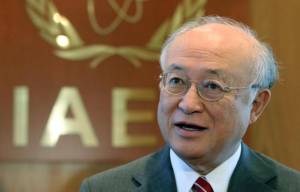
Yukiya Amano, director-general of the International Atomic Energy Agency. (Ronald Zak/AP)
Although the UN investigation into Iran’s nuclear activity has ended and remains incomplete, the United States and European Union are moving forward to implement the nuclear deal, apparently caving in to Iranian threats.
The U.N. nuclear agency closed the books Tuesday on its decade-long probe of allegations that Iran worked on atomic arms, despite acknowledgement by the head of the agency that the investigation remains incomplete.
The probe had to be formally ended as part of a deal between Iran and six global nations to crimp Iranian nuclear programs that could be used to make weapons in exchange for the removal of economic sanctions. A resolution was approved by consensus of the 35-nation board of the U.N.’s International Atomic Energy Agency.
The move means that some questions about the alleged weapons work may never be resolved.
Ahead of the resolution’s adoption, agency head Yukiya Amano told the board that his investigation could not “reconstruct all the details of activities conducted by Iran in the past.”
At the same time, he repeated an assessment he made last month that Iran worked on “a range of activities relevant” to making nuclear weapons, with coordinated efforts up to 2003 tapering off into scattered activities up to 2009.
Despite Iranian denials, the United States and its allies continue to believe that Tehran did such work. But their overriding interest is moving ahead to implement the July 14 deal that focuses on limiting Iran’s nuclear activities for more than a decade.
They seem to be caving in to Iranian demands. According to a recent AFP report, Iran threatened there would be no deal unless the probe comes to an end.
“The decision made today was political and not practical, and it sends a wrong message to the Iranians, that the international community is willing to look the other way,” Israeli Energy Minister Yuval Steinitz stated.
Europe Avoids Condemnation of Iran
A European Union statement reflected the will to move on. Unlike in previous statements, it avoided condemning Iran over its alleged weapons research and development program, saying only that “we note” the agency conclusion.
U.S. chief delegate Henry S. Ensher was more critical. Harking back to standard language from Washington, he said the U.N. agency’s assessment was not surprising, considering “Iran’s long history of concealment, denial and deception.”
Ensher also suggested the agency could again be called upon to investigate Iran, noting that the closure of the probe does not prevent the agency from following up on “any new concerns regarding weaponization.”
Still, most of his comments were low-key and forward-looking. The resolution ending the investigation was drawn up by the United States and the other nations that negotiated the deal with Iran — Russia, China, Britain, France and Germany.
Once approved, it opens the way for implementation of the deal, which is formally expected next month. Once the agency confirms that Iran has modified or cut back on programs and activities that could be re-engineered to produce the fissile core of nuclear weapons, individual and international sanctions imposed on Iran over its nuclear program will be lifted.
By: AP and United with Israel Staff
